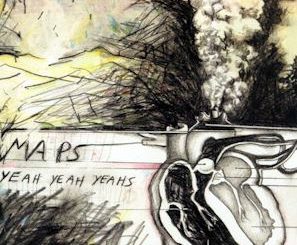Dudley by Yeah Yeah Yeahs Lyrics Meaning – Unveiling the Emotional Labyrinth in Song
- Music Video
- Lyrics
-
Song Meaning
- A Season of Discontent: A Dissection of the Opening Verse
- The Vicious Cycle of Desire: Repetition as a Narrative Device
- The Delicate Dance of Emotional Dependency: The Hidden Meaning of ‘My dear, you’ve been used’
- Staring into the Abyss: The Struggle for Self-Reinvention
- The Rebirth in Resignation: ‘Use Me Up’
Lyrics
No one isn’t ever gonna make it there yet
If you can’t even cope with it
Then you’ll pass me by
You’ll take it over
And make it mine
Fast slow living is a holding me back
Wishing that my baby never told me that
I can’t even cope to make it last
Then you’ll pass me by
You’ll take it over
And make it mine
Then you want it a want it a want it again
Then you want it a want it a want it again
Then you want it a want it a want it again
Then you want it a want it a want it again
My dear, you’ve been used
I’m breaking the news
Love nearly beat us
I’m thinking like you
I’m thinking of you
Love follows near us
Can love really steer us?
Oh can it be true?
Oh can it be true?
Lost all reason after playing your game
Better quit staring cause your looking the same
I can’t even cope to make a change
Then you’ll pass me by
You’ll take it over
And make it mine
Use me up,
Use me up,
Taper off and I’m had
The Yeah Yeah Yeahs have a knack for crafting songs that cut deep while they sling slingshot melodies into the stratosphere of alternative rock. ‘Dudley,’ a less mainstream gem hidden within their second album, ‘Show Your Bones,’ is an exemplary showcase of this talent. The track emerges as an enigmatic whisper, only to unravel into a confessional of love, loss, and self-discovery.
At its core, ‘Dudley’ spins a yarn of romantic disillusionment, but the layers within its lyrics suggest a far more complex narrative. One that resonates with the ache of unmet expectations and the tenacity needed to rise above the ashes of a relationship that has lost its fire. Here, we delve into the meaning behind this poignant composition by the Yeah Yeah Yeahs.
A Season of Discontent: A Dissection of the Opening Verse
The song opens up with a sense of struggle against the ever-changing tides of ‘Hot cold season’ that stand as a metaphor for the ups and downs of a relationship or perhaps life itself. It’s a battle where the end goal seems just out of reach – ‘No one isn’t ever gonna make it there yet.’ The lyrics suggest a resignation to the harsh truth that some objectives might forever linger on the horizon, untouchable and taunting.
The notion of coping becomes a recurrent theme as the singer contemplates the distance growing between lovers. When one ‘can’t even cope with it,’ they are left behind. Thus begins the transfer of ownership of emotions, dreams, or the relationship itself to the one who perseveres, ‘You’ll take it over / and make it mine,’ pointing towards a dynamic of dominance and submission that often plays out in love’s arena.
The Vicious Cycle of Desire: Repetition as a Narrative Device
Repetition plays a crucial role in ‘Dudley.’ The line ‘Then you want it a want it a want it again’ is not just a lyrical hook but a mirror to the cyclical nature of human longing. It points toward the insatiable nature of desire – that no matter the emotional costs, the hunger for more, for that elusive ‘it,’ remains. Perhaps ‘it’ represents love’s return, acceptance, or the rekindling of a passion thought extinguished.
This repetition sets up an addictive rhythm, trapping the listener within the same cycle that ensnares the song’s subject. It becomes an incantation, a spell that keeps you returning to the same patterns, the same mistakes – an all-too-human loop that is as intoxicating as it is inevitable.
The Delicate Dance of Emotional Dependency: The Hidden Meaning of ‘My dear, you’ve been used’
The heart of ‘Dudley’ might just lie in its middle verse – ‘My dear, you’ve been used / I’m breaking the news.’ It’s a poignant admission of relational exploitation, whether intentional or not. The line hints at the unpleasant revelation that comes with recognizing one’s role as a pawn in someone else’s emotional gamesmanship.
The following lines suggest an affinity of experience between the speaker and the addressee, ‘Love nearly beat us / I’m thinking like you.’ There’s a sense of camaraderie in survival, a shared battle against the onslaught of love that often leaves scars. The questioning of love’s ability to guide – ‘Love follows nearus. Can love really steer us?’ – throws into doubt the reliability of emotions that have proven to be treacherous navigators.
Staring into the Abyss: The Struggle for Self-Reinvention
‘Lost all reason after playing your game / Better quit staring cause you’re looking the same.’ In these lines, the transformative potential of heartbreak reveals itself. The game – a metaphor for the relationship – has stripped reason away, leaving bare the need for change. Yet, there’s a warning against the paralysis of introspection, a call to action rather than continuous reflection that reveals nothing new.
Change becomes imperative, yet it’s not without its own complexities. The inability to ‘cope to make a change’ suggests a torpidity, a resistance faced when the familiarity of pain is pitted against the fear of the unknown. There’s an undercurrent of struggle in this impasse, reinforcing the theme of emotional survival threading through the song.
The Rebirth in Resignation: ‘Use Me Up’
As the song nears its denouement, the words ‘Use me up, Use me up, Taper off and I’m had’ resound with a somber tone. Submitting to the inevitable, the narrator appears to accept their fate, suggesting that even in their depletion, there is a strange sense of fulfillment. To be used up is not only to lose oneself to another but perhaps also to find a new identity in this act of self-surrender.
But there’s also defiance in submission – an act of control within the loss of control. The ‘had’ bespeaks both the fact of having been consumed and also at last achieving a sense of completion, even if it’s not the one originally sought. ‘Dudley’ ends not with an exclamation but with an ellipsis, an acknowledgement that the story goes on beyond the confines of song, continuing in the silent resilience of heartache.








